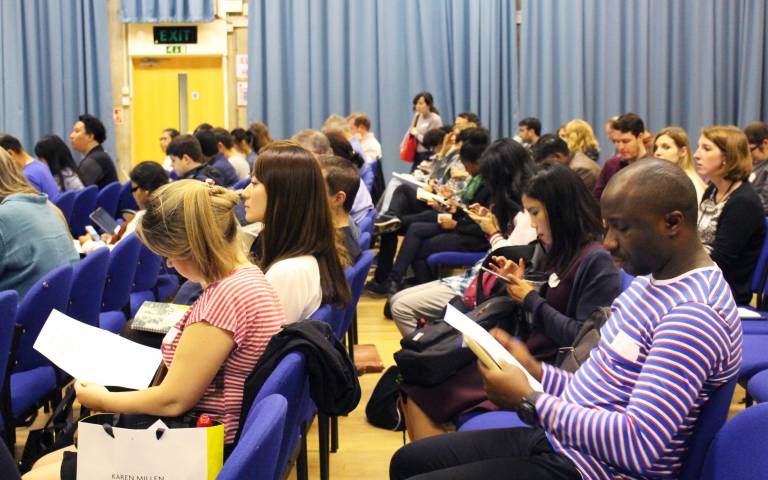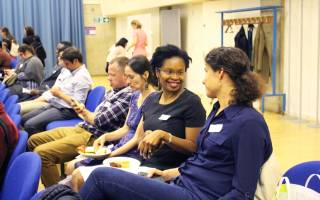Global Opportunities event offers UCL early careers staff practical career advice
8 June 2018
The event aimed at UCL's early career staff brought the academic community together to share best practice and highlight global opportunities

The inaugural ‘Global Opportunities for Early Careers Staff’ event took place at UCL’s Institute of Education (IOE) on 4 June, offering academic writing tips, grant and paper application advice and information about UCL’s global funding opportunities.
Co-organised by UCL’s Global Engagement Office (GEO), the Organisational Development department and the Office of the Vice-Provost for Research (OVPR) with committee representation from all UCL Domain Early Career Staff networks, the half-day event was split into two main sections, with networking opportunities bookending the talks.
Research Development Programme
Kicking off the conference, David Bogle, Professor of Chemical Engineering, outlined the research landscape at UCL today. “Research is very much an international business,” he said. “Everything we do can have an international impact.”
David explained that while all indicators point to UCL being a great place to do research – it is the top-rated university in the UK for research strength in the latest Research Excellence Framework – there is always room for improvement.
Echoing this sentiment, Richard Laughlin, UCL’s Head of Organisational Development, then talked through the UCL Research Staff Hub, a “One stop shop for everything to do with research staff development.”
He explained that there are a number of events taking place as part of UCL’s Research Development Programme over the coming months, with topics including managing people for the first time; writing a book and finding your voice as an academic writer.
Future plans for research development at UCL, Richard explained, include enhanced researcher mentoring provision, the opening of a research development centre and increased availability of career coaching.
 Global Engagement Funds
Global Engagement Funds

Chris Cook, Project Manager (Grants & Evaluation) at GEO, talked through the Global Engagement Funds, an annual small grant scheme for global partnerships which “enables a meeting of minds that wouldn’t otherwise happen.”
Chris cited the work of Professor Monica Lakhanpaul as an example of just how beneficial applying for the funds can be; Monica’s work alongside Professor Marie Lall (UCL Institute of Education and Pro-Vice-Provost South Asia) and Dr Priti Parikh (UCL Department of Civil, Environmental & Geomatic Engineering) ultimately led to the securing of a £500,000 MRC grant.
Chris told the audience: “41 per cent of awards went to early career staff last year, so it’s well worth applying.” He also mentioned the UCL Research Catalyst Awards and Grand Challenges Small Grant scheme as viable international funding opportunities.
Former recipients of the Global Engagement Funds then spoke through their projects and the application process, including Yasemin Allsop, from the Department of Learning and Leadership at the IOE, who is working with the Payas STEM Centre in Turkey on educational interventions for refugee children.
She advised: “Communicate the UCL ethics procedure clearly right from the start and ensure that it has been followed thoroughly. We did mock interviews to make sure we were all on the same page.”
Academic writing advice
In the final session, ‘Getting published in international journals,’ academics from across UCL offered their advice on writing and publication.
Professor Claire Cameron, Professor of Social Pedagogy at the IOE, advised: “Get a mentor or a buddy if you are new to writing papers, who can critically examine your work at an early stage.”
She added: “'Non-native English speakers would be best working with a native speaker before sending a draft paper to editors.”
Professor David Price (Vice-Provost Research), meanwhile, urged early career staff to publish only their best work. “One outstanding paper is better than a handful of mediocre ones,” he said.
In his session on writing a good MS review, Dr Nigel Field, Lead for the Centre of Molecular Epidemiology and Translational Research at the Institute for Global Health, provided numerous practical tips, including to reviewers to be polite, fair and professional at all times (“even if you hate the paper”); to briefly summarise the manuscript and key findings; and to make life easy for the editor and authors by being precise about exactly where and what the problem is.
Building academic communities
Passing on his advice for getting published, Professor George Letsas, Vice-Dean International at UCL Faculty for Laws, said: “Think about the five-10 people you want to read your work throughout the world. Where do they tend to publish?”
“Who do they cite? Which conferences do they attend? Target these. This is how academic communities are built.”
He also advised, “Grow out of the PhD writing style: Prose matters, and academic writing does not have to be boring.”
 Close
Close

